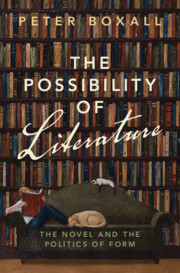Book contents
- The Possibility of Literature
- The Possibility of Literature
- Copyright page
- Dedication
- Epigraph
- Contents
- Figures
- Acknowledgements
- Introduction
- Part I On Writers
- Chapter 1 A Sort of Crutch
- Chapter 2 Samuel Beckett
- Chapter 3 A Leap Out of Our Biology
- Chapter 4 A More Sophisticated Imitation
- Chapter 5 A Cleaving in the Mind
- Chapter 6 Zadie Smith, E. M. Forster and the Idea of Beauty
- Part II On Literary History
- Part III On the Contemporary
- Notes
- Bibliography
- Index
Chapter 4 - A More Sophisticated Imitation
Ishiguro and the Novel
from Part I - On Writers
Published online by Cambridge University Press: 10 October 2024
- The Possibility of Literature
- The Possibility of Literature
- Copyright page
- Dedication
- Epigraph
- Contents
- Figures
- Acknowledgements
- Introduction
- Part I On Writers
- Chapter 1 A Sort of Crutch
- Chapter 2 Samuel Beckett
- Chapter 3 A Leap Out of Our Biology
- Chapter 4 A More Sophisticated Imitation
- Chapter 5 A Cleaving in the Mind
- Chapter 6 Zadie Smith, E. M. Forster and the Idea of Beauty
- Part II On Literary History
- Part III On the Contemporary
- Notes
- Bibliography
- Index
Summary
At the heart of Kazuo Ishiguro’s 2021 novel Klara and the Sun is a singular act of imitation, in which Klara, a synthetic human, is asked to take the place of her owner, the sick child Josie.
This essay addresses this moment, in order to ask how far the novel form is able to perform this kind of ventriloquism, to undertake acts of imitation that might replace or supersede those that they imitate.
In order to respond to this question, the essay suggests, we need to put Klara and the Sun in conversation with the rest of Ishiguro’s oeuvre, which is itself in conversation with the longer history of the novel form. From Artist of the Floating World to The Unconsoled to Klara, Ishiguro has been concerned with the capacity of art to become the reality it imitates, and particularly with the capacity of the novel voice to pass through the boundary between original and copy. Klara might suggest that contemporary technologies have made this boundary newly porous; but the essay argues that the novel form has always sat at the difficult junction between voice and its replications. When he makes an artificial being speak in the voice of its owner, Ishiguro does not depart from the protocols of narrative voice, but rather gains access to its interior mechanisms, in a way that is illuminating for the critical power of fiction under contemporary biopolitical conditions.
- Type
- Chapter
- Information
- The Possibility of LiteratureThe Novel and the Politics of Form, pp. 87 - 103Publisher: Cambridge University PressPrint publication year: 2024

